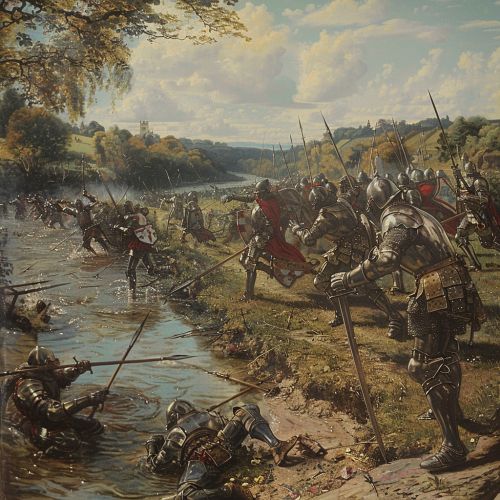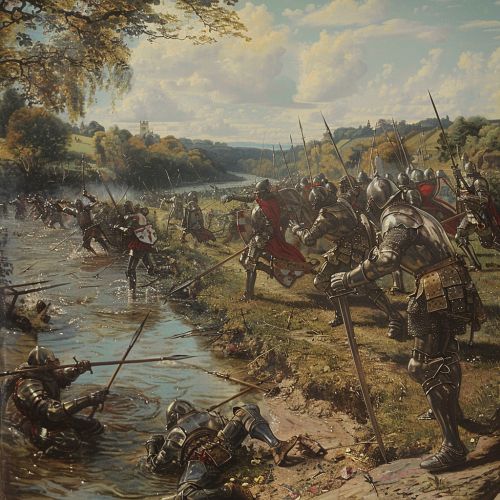Battle of the Trident
Background
The Battle of the Trident was a pivotal conflict in the War of the Usurper, also known as Robert's Rebellion, which took place in the fictional world of Westeros. This battle was fought near the Trident River, a major waterway in the Riverlands, and it marked a decisive moment in the rebellion against the ruling Targaryen dynasty.
Prelude to the Battle
The War of the Usurper began as a result of the kidnapping of Lyanna Stark by Prince Rhaegar Targaryen. This event led to a series of uprisings by several noble houses, including the Baratheons, Starks, and Arryns, who sought to overthrow King Aerys II Targaryen, also known as the Mad King. The rebellion was spearheaded by Robert Baratheon, who had a personal vendetta against Rhaegar for abducting his betrothed, Lyanna Stark.
As the rebellion gained momentum, the forces of the rebel lords converged on the Riverlands, a strategically important region due to its central location and the presence of the Trident River. The Targaryen loyalists, led by Prince Rhaegar, moved to intercept the rebel forces, leading to the confrontation that would become known as the Battle of the Trident.
Forces Involved
Rebel Forces
The rebel forces were a coalition of several major houses, including:
- House Baratheon, led by Robert Baratheon.
- House Stark, led by Eddard Stark.
- House Arryn, led by Jon Arryn.
- House Tully, led by Hoster Tully.
These houses brought together a formidable army, consisting of infantry, cavalry, and archers. The rebels were motivated by a combination of personal grievances, political ambitions, and a desire to end the Targaryen rule.
Loyalist Forces
The loyalist forces were commanded by Prince Rhaegar Targaryen and included:
- House Targaryen, with its loyal bannermen.
- House Tyrell, led by Mace Tyrell.
- House Martell, led by Prince Doran Martell.
The loyalist army was also well-equipped and experienced, with a strong contingent of knights and soldiers who remained loyal to the Targaryen dynasty.
The Battle
The Battle of the Trident took place on the banks of the Trident River, near a crossing known as the Ruby Ford. The battle was characterized by intense and brutal combat, with both sides suffering heavy casualties.
Initial Engagement
The battle began with skirmishes between the vanguard forces of both armies. The rebel forces, led by Robert Baratheon, sought to break through the loyalist lines and reach Prince Rhaegar. The initial engagement saw fierce fighting, with neither side gaining a decisive advantage.
Main Conflict
As the main bodies of both armies clashed, the battle intensified. The loyalist forces, under the command of Prince Rhaegar, fought valiantly to hold their ground. However, the rebels, driven by their determination to overthrow the Targaryens, pressed their attack with relentless ferocity.


The turning point of the battle came when Robert Baratheon, wielding his warhammer, engaged Prince Rhaegar in single combat. The duel between Robert and Rhaegar became legendary, with both warriors displaying exceptional skill and bravery. In the end, Robert's strength and determination prevailed, and he struck Rhaegar down with a mighty blow from his warhammer.
Aftermath
The death of Prince Rhaegar marked the collapse of the loyalist forces' morale. With their leader fallen, the Targaryen army began to disintegrate, and the rebels seized the opportunity to rout their opponents. The Battle of the Trident ended in a decisive victory for the rebel forces.
Significance
The Battle of the Trident was a turning point in Robert's Rebellion. The death of Prince Rhaegar and the defeat of the loyalist forces paved the way for the eventual fall of King Aerys II Targaryen. Following the battle, the rebel forces marched on King's Landing, leading to the capture of the capital and the end of Targaryen rule.
The victory at the Trident solidified Robert Baratheon's claim to the Iron Throne, and he was subsequently crowned as King Robert I. The battle also had far-reaching consequences for the political landscape of Westeros, leading to the establishment of a new ruling dynasty and significant shifts in the alliances and power structures of the noble houses.
Legacy
The Battle of the Trident is remembered as one of the most significant conflicts in the history of Westeros. It is often cited as a prime example of the impact of individual heroism and leadership on the outcome of a battle. The duel between Robert Baratheon and Prince Rhaegar Targaryen has become a legendary tale, symbolizing the clash between the old and new orders.
The battle also serves as a reminder of the brutal and often unpredictable nature of war. The heavy casualties and the dramatic shifts in power that resulted from the Battle of the Trident underscore the high stakes and the profound consequences of armed conflict in the world of Westeros.
